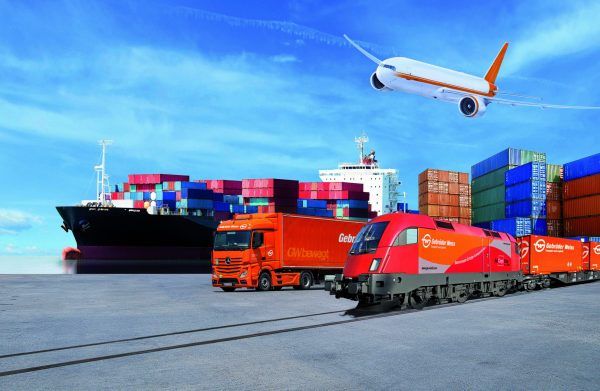International logistics leader reports 10% net revenue gain year over year and in North America, strategic expansion drives revenue growth by 47%
The international transport and logistics company Gebrüder Weiss closed the 2024 fiscal year with net revenues of 2.71 billion euros/2.92 billion dollars, representing a ten-percent gain over the previous year (2023: 2.46 billion euros/2.65 billion dollars). “We’re firmly on track: Despite geopolitical and economic tensions, we gained market share and grew, countering the overriding trend. By investing in our network, automation and digital innovation, we succeeded in expanding our range of services and developing the transport solutions our customers need– with the explicit aim of guaranteeing supply chain stability,” says Wolfram Senger-Weiss, CEO of Gebrüder Weiss.
In the Air & Sea sector, the group reported the highest increase in revenue with 939 million euros/1.01 billion dollars, a gain of 21 percent (2023: 776 million euros/837 million dollars). This growth was powered by various factors, including the expansion of the networks in the United States and Germany, alongside high transport volumes in transpacific trade. Rising sea freight rates for exports from China to Europe provided an additional boost. Attacks in the Red Sea forced container ships to take the longer route around the Cape of Good Hope (South Africa) instead of through the Suez Canal.
Revenues in the Land Transport and Logistics segment rose by five percent to 1.52 billion euros/1.63 million dollars (2023: 1.45 billion euros/1.56 billion dollars). This figure includes sales generated by the Home Delivery service. Cargoes such as refrigerators and furniture are transported to end customers in Austria and several eastern European countries, implementing a two-man handling service.
DPD Austria, which is partly owned by the Gebrüder Weiss parcel service, processed more than 63.2 million parcels last year. This translates into an increase of one million parcels compared to 2023. The main growth drivers were exports and private consumers.
The company’s equity ratio remained steady at 60 percent, positioning Gebrüder Weiss as a crisis-resistant service provider and a dependable employer. The workforce across the group’s 180 locations worldwide rose slightly to 8,700 (2023: 8,600).
Despite the economically challenging environment, the logistics provider adhered to its investment strategy. During the 2024 fiscal year, a total of 124 million euros/129 million dollars were devoted to expansion and modernization measures, environmentally friendly power generation, and e-mobility.
Investments in logistics locations, automation, and digitalization
Gebrüder Weiss commenced construction of a modern logistics and IT center featuring a fully automated high-bay warehouse in the immediate vicinity of its corporate headquarters and the Wolfurt freight terminal (Vorarlberg/Austria). A new logistics facility was opened in the southern German town of Straubing, providing Bavaria’s industrial and commercial players with efficient transport links to national and global markets. Gebrüder Weiss also expanded its locations in Maria Saal (Austria), Aldingen (Germany), Bratislava (Slovakia) and Tbilisi (Georgia). In Budapest (Hungary), an Autostore warehouse was built as part of the site expansion program; here, inbound cargo handling, material flows, and order picking are largely automated.
In North America, revenues grew by 47%, driven in part by strategic expansion across the U.S. Southwest and Intermountain West. The U.S. business acquired air-and-sea freight forwarder Cargo-Link in Salt Lake City, Utah, and opened new branch office locations in Denver, Colorado, and Phoenix, Arizona. These new additions enhanced regional LTL, FTL, and LCL service capabilities and brought the number of company-owned locations in North America to 17. To combat the rise of freight fraud and double brokering, the U.S. team developed a partnership with Highway, a leading carrier identity company. The logistics leader also partnered with Turvo, utilizing its Collaborative Transportation Management System software for greater transparency and efficiency.
Gebrüder Weiss has also charted further progress with its digital service palette: The number of customer-based users registering for the myGW portal has risen to 25,000 since its launch in 2020. The platform provides real-time information on all goods flows and gives customers full transparency on the progress of their orders. In 2024, the application’s functions were progressively fine-tuned to better meet customers’ needs.
Expanding renewable energy and e-mobility
The company took important steps towards decarbonization and climate-friendly power generation. Additional photovoltaic (PV) systems were installed in Hungary and Slovakia. Gebrüder Weiss now operates 34 PV systems, which generated some 13,000 megawatt hours of electricity during the last fiscal year. This equals roughly half of the power requirements of all Gebrüder Weiss locations worldwide. The increased use of solar energy has led to overall savings of 2,738 metric tons of CO2.
To further reduce CO2 emissions on a sustainable basis, Gebrüder Weiss is also reorganizing its own fleet and progressively deploying vehicles with electric drives. In Austria, Hungary, Croatia, and Romania, the logistics company is already utilizing e-transporters to deliver goods ordered online to private households. In Germany, two electric trucks were introduced in 2024, and a further 13 will follow in Austria this year. As an initial step, the logistics provider has already converted a large part of its truck fleet in Austria to hydrogenated vegetable oil (HVO), which can potentially reduce CO2 emissions by some 90 percent (compared to diesel fuel).
Wolfram Senger-Weiss explains: “Along with the issues of sustainability, infrastructure, and digitalization, the logistics industry faces numerous other hurdles this year. The persistently weak economy in Europe, new tariffs, and the crisis in the automotive industry are intensifying the competition for many companies. Gebrüder Weiss will continue to meet these challenges with a solution- and technology-oriented approach while aligning its general business strategy to the needs of its customers.”











